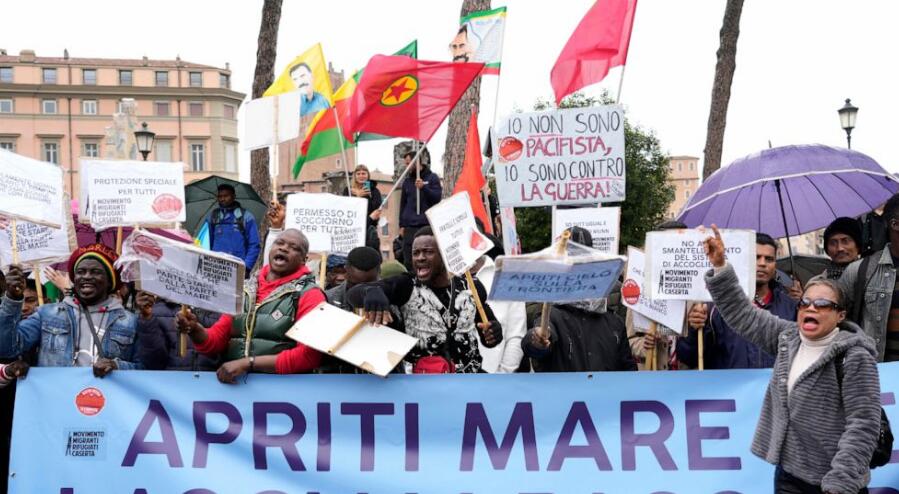Italy’s contested bid to crack down on migrants sparks flap
Bogged down by leftist opposition amendments, Italy’s Senate on Tuesday delayed the start of a debate on the right-wing government’s contested immigration crackdown, while a minister’s warning to Italians about “ethnic substitution” triggered anger.
Agriculture and Food Sovereignty Minister Francesco Lollobrigida, made the controversial comment in a speech at a labor union gathering, Lollobrigida, who hails from Premier Giorgia Meloni’s Brothers of Italy, a party with neo-fascist roots, warned Italians against surrendering to the idea that they “have fewer children and substitute themselves with someone else.”
Lollobrigida’s words are “disgusting,″ said lawmaker Elly Schlein who leads the Democratic Party, Parliament’s largest opposition force. She said the comments evoke the notion of “white supremacy” and hark back to the 1930s, when Benito Mussolini’s Fascist regime rewarded Italians who had large families.
Meloni campaigned for election as Italy’s first far-right premier last fall on a platform that included a pledge to help Italians have children. The country has one of the world’s lowest birth rates, and a significant percentage of births are now registered to non native-born Italians. In Italy’s northern Emilia-Romagna region, for instance, 24% of births occur in families where both parents are migrants, according to the national statistics agency.
With the new proposed legislation, Meloni and her right-wing coalition government allies want to eliminate or vastly limit the “special protection” status Italian authorities have granted to thousands of asylum-seekers who are unlikely to have their applications approved. Holders of that status can stay in Italy for two years and legally work during that time.
But with the Democratic Party presenting hundreds of amendments, the Senate was forced to delay the start of debate till Wednesday. The lower Chamber of Deputies will take up the proposed crackdown after Senate passage. Meloni’s coalition has a comfortable majority in both chambers of Parliament.
Successive Italian governments have pressed their EU partners for years, largely in vain, to take in many of the hundreds of thousands of asylum-seekers who reach Italy’s Mediterranean shores. Most risk the dangerous, expensive sea voyage in hopes of finding family or work in northern Europe, but EU rules require them to apply for asylum in the country where they landed.
During a state visit to Poland this week, Italian President Sergio Mattarella, whose post is above the political fray, championed solidarity. “No state, alone, can deal with such an epochal problem,” he said in a speech. ”But the European Union can do it with coordinated and well-organized action.”
“And this … calls for a new policy of immigration and asylum within the Union, overcoming old rules that by now are prehistoric,” Mattarella said in his blunt appeal.
Meloni unveiled the first stage of her government’s approach to stemming unauthorized migration last month, when she led a Cabinet meeting in a Calabrian beach town near where dozens of migrants died in the shipwreck of a smugglers’ boat.
The Cabinet decreed a new crime — people smuggling that results in the death of migrants — punishable by up to 30 years in prison.
At least 91 people died — and 80 people survived — in the shipwreck just off Cutro’s beach, prompting questions over whether Italian rescue vessels should have gone to the aid of the boat as it was buffeted by high waves.
“The signal that we wanted to give right away was that the smugglers can’t do what they want and that in Italy you arrive in a legal way,” Meloni’s minister for parliamentary relations, Luca Ciriani, said in an interview with Corriere della Sera newspaper published Tuesday.
But further measures were needed, he said, contending that Italy’s current rules on migrants were more “permissive” than those of other EU countries. “Here, thanks to humanitarian protection, whoever should be expelled finds the way to stay,” the minister was quoted as saying.
Among those demonstrating a few blocks from the Senate for the special protection status to stay was Mamadou Kouassi, a migrant from Ivory Coast. He recounted how he arrived in Italy after members of the Italian coast guard rescued him at sea in 2005.
”We live in this country, and we want residency permits. We want to work and participate in the economy and development of this country,” he said.
Meloni’s government already has made it more challenging for charity rescue boats to operate in the central Mediterranean. Such boats now are ordered to disembark their rescued passengers at mainland ports far from the area of the sea that has been most deadly for migrants.
